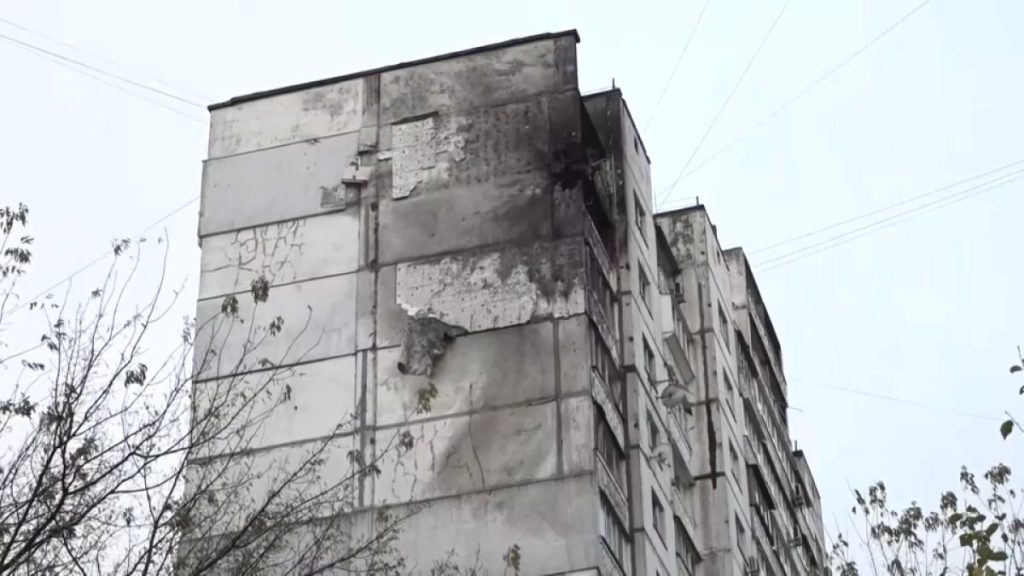Over the course of five hours, Kyiv experienced multiple air raid sirens as Russian drones targeted the capital city. The aftermath of the attack resulted in significant damage across six city districts, with fallen debris from intercepted drones wreaking havoc on buildings and infrastructure. Ukraine’s air force reported that Moscow launched a total of 71 Iranian-made drones towards Kyiv, with most being either intercepted or diverted off course through GPS jamming. These drones caused destruction, including sparking a fire in a 16-storey building and damaging a high-voltage power line, causing power outages. Ukrainian President Volodymyr Zelenskyy expressed the frequency of drone threats faced by Ukraine, stating that Iranian-backed UAVs have become a primary tool of Russian aggression.
In response to the drone attacks on Kyiv, Ukrainian forces successfully shot down 39 drones and reported losing 21, with some drones flying back towards Russia. The destruction caused by the fallen debris highlights the ongoing conflict between Russia and Ukraine, with Ukrainian officials pointing to the drones as a key instrument of Russian terror. President Zelenskyy also mentioned drone strikes in other regions, such as Poltava, Sumy, and Kharkiv, underscoring the widespread nature of the attacks. The Commander-in-Chief of the Armed Forces emphasized the need for a continuous supply of resources to combat what is described as one of the most powerful Russian offensives since the beginning of the invasion.
Kyiv’s City Military Administration confirmed the extent of the damage caused by the intercepted Russian drones, with the debris impacting various structures in the city. Ukrainian energy provider DTEK reported that the fallen drones damaged a high-voltage power line, leading to power outages in the capital. Despite the destruction, efforts are underway to repair the damage and restore power to the affected areas. The incident highlights the vulnerability of urban centers like Kyiv to drone attacks and the importance of maintaining critical infrastructure in areas of conflict.
The drone attacks in Kyiv serve as a stark reminder of the ongoing conflict between Russia and Ukraine and the use of advanced military technology in modern warfare. The targeting of populated areas like the capital city underscores the devastating impact of drone attacks on civilian infrastructure and lives. President Zelenskyy’s acknowledgment of the continuous threat posed by drone attacks reflects the daily challenges faced by Ukrainians as they defend against Russian aggression. The global community continues to monitor the situation in Ukraine, with calls for a peaceful resolution to the conflict and support for the Ukrainian people as they strive to defend their sovereignty.
As the conflict intensifies, the need for international support and solidarity with Ukraine becomes increasingly apparent. The drone attacks on Kyiv and other regions demonstrate the relentless nature of the Russian offensive and the resilience of the Ukrainian people in the face of adversity. The ongoing battle for control and sovereignty in Ukraine underscores the importance of diplomatic efforts to de-escalate tensions and find a peaceful resolution to the conflict. The world watches as Ukraine defends its territory and fights for its future against the backdrop of increasing military engagement and technological warfare.
In the midst of continued attacks and destruction, the people of Ukraine stand united in their resistance against foreign aggression and strive to protect their homeland. The aftermath of the drone attacks in Kyiv serves as a grim reminder of the toll of war on civilian populations and the urgent need for international intervention to prevent further escalation. In the face of adversity, Ukrainians remain steadfast in their determination to defend their sovereignty and preserve their way of life. The resilience of the Ukrainian people in the face of ongoing conflict serves as a testament to their strength and resolve in the fight for peace and freedom.


